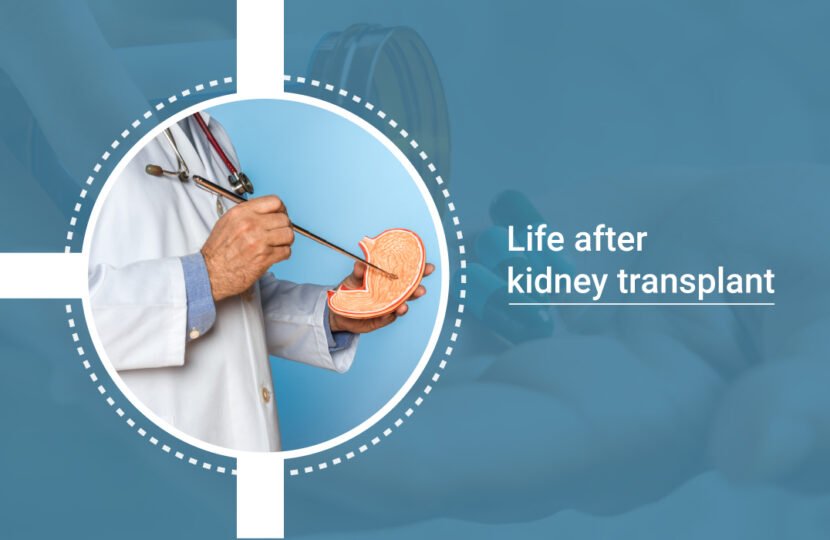A kidney transplant is surely a life-saving procedure. It is a procedure of replacing a dysfunctional kidney with a working donated kidney. As dialysis can only be a bridge between kidney failure and transplantation, it can never substitute a real kidney. Therefore, a kidney transplant is often perceived as a second chance of living life to the fullest. But can a donated kidney give a patient so much liberty to live life completely normally? Aren’t there any subtle limitations after a kidney transplant? We feel like these questions and more must be answered. The immediate and lifelong changes that a transplant patient has to bring or do come on their own in his/her lifestyle are the main focus of this blog.
What are the physical challenges after a kidney transplant?
Recovery
What your physical health is going to be like after the kidney transplant can be predicted from your physical health before the transplant. Also, the time for which the patient is put on dialysis is extremely exhausting time. Due to this the recovery of physical health after the transplant certainly depends upon the time for which the patient was on dialysis before the transplantation. The more time for dialysis more will be the recovery period.
It is important for kidney patients that their doctors ask them about their limitations to do work on their own, the extent of assistance they need to do specific work, and the restrictions in doing their daily activities. All these questions help the doctors to evaluate the tendency of the patient to be physically independent before surgery. This tendency is measured by giving a specific score to the physical abilities of the patient with regard to a scale known as the Karnofsky scale.
Surgical pain
An important factor that comes in the physical challenges after the transplantation is the question of pain. To reduce pain and to be less invasive the surgeons implant the donated kidneys in the pelvis while leaving the native kidney in the back. This helps the patients to recover rapidly after surgery. Moreover, to reduce normal surgical pain, it is ensured that the patients take oral medications for 24 to 48 hours and regain mobility as soon as possible.
Weight changes
Initially, after surgery patients notice that they are much heavier than their listed dry weights. The reason for this is that the patients are given a lot of IV fluids during and after the surgery. After a few weeks, patients gradually put on more weight as a side effect of the immunosuppressant that these patients have to take
Medications after kidney transplantation
The most important medication given after kidney transplantation is immunosuppressive agents. As our bodies are designed to recognize the self organs from the nonself organs, our immune system can recognize the transplanted kidney as a foreign entity. This can cause our immune system to attack the kidney and cause rejection. The role of an immunosuppressive agent is to keep your kidney from stimulating your immune system which can cause rejection.
These immunosuppressive agents consist of IV medication at the time of surgery and 2-3 oral medications for the time a donated kidney remains as a functional kidney in your body.
Some common challenges with the medications that the patients face are:
- Dosing of medications twice daily at strict 12 hours intervals
- Regular adjustments of dosage
- Requirement of tests after each adjustment of dosage
It is important that the patients taking the medications strictly follow the dosages. One dose of one medication, if skipped, could be enough to cause the rejection. The most terrifying problem with kidney rejection is that they are most often silent with no early symptoms.
Medication side effects after kidney transplant
The medications do work efficiently to prevent kidney rejection, but they are not without side effects. Some of the side effects are as follows:
- Tremors
- Hair loss
- Infections
- Increase in cholesterol
- Blood sugar increase
- Fluctuation in blood pressure
Emotional Challenges after kidney transplantation
If you are suffering from any emotional disorders before transplantation, it is a high probability that these conditions such as anxiety, depression, bipolarity, etc, worsen after the kidney transplantation. The reason for this can be both clinical and social. The clinical aspect of emotional change is related to the transplant medication and the social reasons to suffer from emotional changes might be related to improper interaction with people, financial condition, and guilt of taking the donated kidney.
It is important to know that the functionality of the native kidney cannot be replaced with a donated kidney. But kidney transplants can be life-saving and life can still be meaningful if not more free. It is necessary for us to inform you that we take your post-surgical conditions very seriously at Alfa Kidney Care and to ensure recovery we begin our procedures with complete precision. To know more, contact us at Alfa Kidney Care


